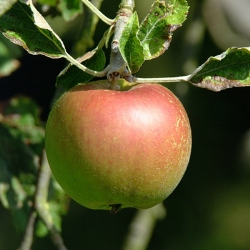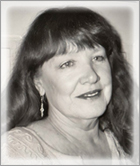
|
Teresa White was born in Seattle, Washington, the second of four siblings: an elder sister, one younger brother, and a younger sister. After attending secretarial school, she worked as a secretary for various companies, finally ending up as as head knitter/secretary
to the president at a large yarn import firm. Teresa says, “One day I told my husband I had knitted my last sweater, typed my last inter-office memo and would spend the remainder of my life doing what I was destined to do: write poetry. I try to write every day—that is, when our four cats have not taken up residence on and about my computer.” To date, Teresa has published two books of poetry,
In
What Furnace? and Gardenias for a Beast both from Two Steps
Publishing Company. The latter, available online through Elliott Bay
Books received a positive endorsement from Billy Collins. She has had over three hundred poems published in print and on line and is a past contributor to
Loch Raven Review. Christopher T. George is co-editor of Loch Raven Review. George was born in Liverpool, England in 1948 and now lives in Baltimore, Maryland, near Johns Hopkins University, with his wife Donna and two cats. Chris works full-time as a medical editor in Washington, DC. He has been writing and publishing poetry since he attended Loyola College, Baltimore, and studied with Sister Maura Eichner at the College of Notre Dame, as well as with poets Elliot Coleman and Marion Buchman. His poems have appeared in numerous publications in the United States and Great Britain. He is also a published historian and a lyricist for a new musical, Jack-The Musical, about Jack the Ripper. George also is the Editor of Desert Moon Review and an editor at Writer’s Block Poetry Workshop. Lisa Janice Cohen is a physical therapist in the Boston area. A poet and an aspiring novelist, Lisa is the head moderator of Wild Poetry Forum and is completing her fourth novel. Samples of her writing, along with a link to her blog can be found at www.ljcohen.net. Along with fellow 'wild poets' Jim Doss, Carole Barley, and Lisa Megraw, she helped edit Poets Gone Wild: an Internet Anthology. Lisa's poetry has appeared in internet and print journals including LRR, World Haiku Review, Stirring--A Literary Collection, and New Solutions. She is also the webmaster of Amaze--a cinquain journal.
|
Fall 2007 Table of Contents - Vol. III, No. 3 |
|
|
Poetry Translations Interview Essays Fiction Book Notes & Reviews |
|
|
Christopher T. George and Lisa Janice Cohen
An Interview with Teresa White
Poet Teresa White is well known at a number of on-line poetry workshops. Ms. White won Poem of the Week at Wild Poetry Forum on September 10 for her poem “Ungodly Apartment Building," an honor that she has achieved nineteen other times previously. The following interview between Teresa White (TW) and Co-Editor Christopher T. George (CTG) and Lisa Janice Cohen (LJC) was carried out in August and September 2007. CTG: Please tell me something about your background and how you came to poetry, your influences, and what keeps you writing. I gather you grew up in Seattle, Washington, is that right? TW: For the most part. There was a period of about ten years when my family traveled. We lived in the states of Oregon, California, Idaho, Kansas, Arkansas, for a year in Australia, and eventually moved back to Seattle. CTG: Did both your mother and father work? What were their professions? TW: My father was a civil engineer who worked in over twenty-six countries. My mother had many different jobs over the years: disc jockey, newspaper journalist, public relations director of a major hospital. CTG: Were your parents bookish in any way? Or did you develop a love of literature independently? TW: My mother majored in Shakespearean literature in college. She loved all the great books and instilled this love of reading in all four of her children. CTG: When did you start writing poetry? TW: In my recollection, I never made any concrete decision to become a poet. As with so many others who pick up their pens, I was compelled to write from some deep and complex emotion even as a child. I still feel that acting on me today after all these years. Poetry is quite simply my most comfortable mode of expression, which doesn’t mean it’s always easy or that it always flows effortlessly. As a child, I did have some strong forces behind me in the creativity department. My mother surrounded us with poetry, music, and nightly readings. It was a great life for a child. When I wrote my first poem, I was hooked. I never went anywhere without a tablet and pen. At about the age of nine, I became a great fan of The New Yorker magazine and looked forward eagerly to it every week for its cartoons and poems. Of course I am sure I didn’t understand them very well at that time. One day in science class, when I was twelve, snow had begun falling for the first time that season and I quickly penned my first poem. Before the week was out, I had written two more. I showed them to my teacher as I wanted to enter them in a Junior Scholastic magazine contest, but he refused to believe I had written them. The fact was I hadn’t shown them to anyone, not even my mother. That is how it all started and I have been writing poetry ever since. When I reached the age of fifteen, I would spend each Saturday in the poetry section of the downtown Seattle library and beginning with “A” was determined to read every volume in the section! LJC: How has the experience of writing changed for you with the discovery of an online poetry community? TW: Thanks for asking, Lisa. Writing poetry is typically a solitary experience. Prior to the advent of on-line workshops, the process of getting feedback often took months, at which point a certain momentum could often be lost. The online environment is wonderful in that it provides timely feedback and allows for interaction and discussion between myself and fellow poets. It is a great feeling to write a poem, post it in a workshop, then wake up the next morning with comments. Mingling with talented poets continually helps me to hone my work. The online community allows poets to connect when they choose to do so and to keep their own counsel when they don’t choose to connect. LJC: Many of your poems use the “I” as narrator. Some appear as if the poet addresses the reader, others are written from a strong and idiosyncratic point of view. How does writing from a more personal point of view differ from inhabiting the point of view of some other character? TW: I think my personality can be aptly described as idiosyncratic, so it is no surprise that my poetry reflects this. In some ways, depending on what is being revealed, the more personal poem is more difficult to write than when I’m writing in another’s voice. Putting raw emotion on the page can be akin to being peeled alive. Well, metaphorically speaking. In a way, there’s more at stake when I write the “I” poem. Like being naked in a crowded theater. One has to be willing to risk a certain self-exposure for the sake of the poem. I feel there is much more freedom when I inhabit the point of view of another character. CTG: Which poets do you count among your influences? TW: Among my early influences were Theodore Roethke, Leonard Cohen, and the Russian poet Yevgeny Yevtushenko. I also developed early on a love for the poetry of Robert Frost, Anne Sexton, William Carlos Williams, E.E. Cummings, Edna St. Vincent Millay, Dylan Thomas, and William Butler Yeats. CTG: Of poets writing today, whom do you read and recommend? TW: Billy Collins, Robert Bohm, Rita Dove, Yusef Komunyakaa, Adrienne Rich, and Ginger Andrews. CTG: Do you regularly submit to print and on-line magazines? TW: After taking a year or so off, I’ve recently begun submitting to on-line magazines again. I submit to print magazines as well, but not as often. It all depends on whether I think I have the requisite five decent poems to send off at any given time. LJC: Is there a theme that runs through your work? How would you describe your work thematically? TW: The theme that tends to run through my work is my observations of the emotions at work in those around me. There’s particularly a lot about my family in my poetry because we were a close-knit, interesting bunch who had many experiences that I would describe as larger-than-life, and therefore intensely vivid even after years have passed. I also write about anything and everything. The past few years seem to have brought out the political poet in me. I try to say something in each poem, try to avoid what I call “navel-gazing”: beautiful, lush poems that really go nowhere. Basically, I want to get at the truth of things. CTG: What tips would you give to up and coming writers? TW: First and foremost I think all writers must learn to be good observers. Wherever you are, learn to take in your environment fully, perhaps even carry a notebook to jot down impressions. These images, yours alone, will later become the very detail crucial to good poems. Second, time is short. If you wish to be a poet, begin thinking of nurturing your most valuable asset: your brain. Choose wisely what you read, what movies you watch, what courses you take. Learn all the names of flowers, twenty different names for the color blue, and as many words as you can. Live a little. Every job is easier with the right tools. Third, this is the computer age. If you feel confident enough, try joining an online poetry workshop. There are ones for every level of poet. Fourth and lastly, I will close by saying that whether or not one is published, the very act of writing poetry is a fine art and age-old craft that has its own satisfying internal rewards.
© Christopher T. George, Lisa Janice Cohen |
|
|
Poetry Translations Interview Essays Fiction Book Notes & Reviews |
